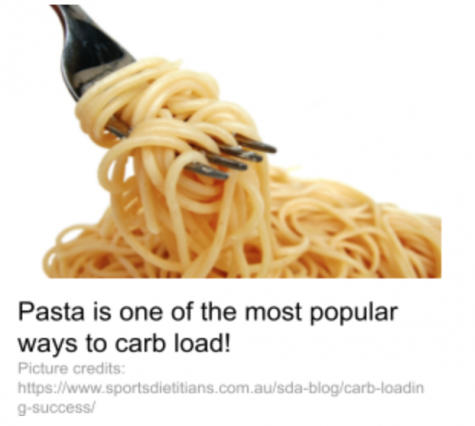Carb-Loading: The Runners Secret
May 19, 2021
Running for long distances can deprive and lower the body’s glycogen levels. If these levels drop too low, a runner could experience ‘hitting the wall’, which is a term used to describe the body running out of glycogen.
Glycogen is a carbohydrate and the body uses these carbohydrates to fuel itself. When there are no more carbs left, the body starts to break down fats and muscles for energy. To prevent this from happening, many runners carb-load the night to a few days before a big race.
Carb-loading can be done many different ways but one of the most common is team pasta parties! The night before a game or meet the team can get together, catch up, and eat pasta. Pasta is a familiar carbohydrate, which like all, will infiltrate the muscles with glycogen, storing up all of the needed fuel. Other popular carb-loading foods include rice, beans, and potatoes.
Potatoes store extra nutrients in their skin making them another excellent choice for a carb-loading food. They are high in potassium, dietary fiber, magnesium, vitamin C, and vitamin B-6. Potassium is useful because it aids in muscle contractions which is key to runners. Dietary fibers help control food pass through the body while magnesium helps build protein strains. Vitamin C helps protect the body’s cells from the production of energy and Vitamin B-6 aids in the regulation of the body’s sleep schedule.
It is not necessary to carb-load before each event but there are benefits in doing so. Pennridge Senior, Sierra Hufnagle, runs the 300 meter hurdles as well as the 4×400 meter relays. She does not run long distances but says, “Even for a 400 I still think it could help.” Carb-loading is proven to be more effective in long distance runners but has not shown any negative effects on short to mid distance runners.
If an official found out that someone had carb-loaded before a race, they would not be disqualified. Morgan Roehl, a sprinter for Pennridge High School, says, “Everyone can carb load if they want to so I don’t think it’s unfair.” It is up to the individual runner what they choose to eat before and after any given race.
Post workout meals are also important and should not be skipped over. They are most important for athletes training vigorously everyday. They can be eaten at any time but are recommended at roughly 45 minutes post-workout. The protein in the meal, such as chicken, beans, and lentils, aid in a faster recovery.
Each athlete has their own decision to make when it comes to preparing and taking care of their body. It is especially important to know what to eat when they push their bodies past its natural limits. Knowing the right nutrition is key to staying in the game for as long as possible. 